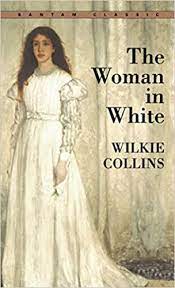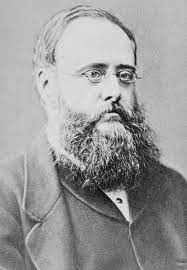The Woman in White Page #12
The Woman in White is Wilkie Collins's fifth published novel, written in 1859. It is a mystery novel and falls under the genre of "sensation novels". The story is an early example of detective fiction with protagonist Walter Hartright employing many of the sleuthing techniques of later private detectives
do assure you, who would have opened their eyes in astonishment, if they had seen Charles the Fifth pick up Titian's brush for him. Do you mind putting this tray of coins back in the cabinet, and giving me the next one to it? In the wretched state of my nerves, exertion of any kind is unspeakably disagreeable to me. Yes. Thank you." As a practical commentary on the liberal social theory which he had just favoured me by illustrating, Mr. Fairlie's cool request rather amused me. I put back one drawer and gave him the other, with all possible politeness. He began trifling with the new set of coins and the little brushes immediately; languidly looking at them and admiring them all the time he was speaking to me. "A thousand thanks and a thousand excuses. Do you like coins? Yes. So glad we have another taste in common besides our taste for Art. Now, about the pecuniary arrangements between us--do tell me--are they satisfactory?" "Most satisfactory, Mr. Fairlie." "So glad. And--what next? Ah! I remember. Yes. In reference to the consideration which you are good enough to accept for giving me the benefit of your accomplishments in art, my steward will wait on you at the end of the first week, to ascertain your wishes. And--what next? Curious, is it not? I had a great deal more to say: and I appear to have quite forgotten it. Do you mind touching the bell? In that corner. Yes. Thank you." I rang; and a new servant noiselessly made his appearance--a foreigner, with a set smile and perfectly brushed hair--a valet every inch of him. "Louis," said Mr. Fairlie, dreamily dusting the tips of his fingers with one of the tiny brushes for the coins, "I made some entries in my tablettes this morning. Find my tablettes. A thousand pardons, Mr. Hartright, I'm afraid I bore you." As he wearily closed his eyes again, before I could answer, and as he did most assuredly bore me, I sat silent, and looked up at the Madonna and Child by Raphael. In the meantime, the valet left the room, and returned shortly with a little ivory book. Mr. Fairlie, after first relieving himself by a gentle sigh, let the book drop open with one hand, and held up the tiny brush with the other, as a sign to the servant to wait for further orders. "Yes. Just so!" said Mr. Fairlie, consulting the tablettes. "Louis, take down that portfolio." He pointed, as he spoke, to several portfolios placed near the window, on mahogany stands. "No. Not the one with the green back--that contains my Rembrandt etchings, Mr. Hartright. Do you like etchings? Yes? So glad we have another taste in common. The portfolio with the red back, Louis. Don't drop it! You have no idea of the tortures I should suffer, Mr. Hartright, if Louis dropped that portfolio. Is it safe on the chair? Do YOU think it safe, Mr. Hartright? Yes? So glad. Will you oblige me by looking at the drawings, if you really think they are quite safe. Louis, go away. What an ass you are. Don't you see me holding the tablettes? Do you suppose I want to hold them? Then why not relieve me of the tablettes without being told? A thousand pardons, Mr. Hartright; servants are such asses, are they not? Do tell me--what do you think of the drawings? They have come from a sale in a shocking state--I thought they smelt of horrid dealers' and brokers' fingers when I looked at them last. CAN you undertake them?" Although my nerves were not delicate enough to detect the odour of plebeian fingers which had offended Mr. Fairlie's nostrils, my taste was sufficiently educated to enable me to appreciate the value of the drawings, while I turned them over. They were, for the most part, really fine specimens of English water-colour art; and they had deserved much better treatment at the hands of their former possessor than they appeared to have received. "The drawings," I answered, "require careful straining and mounting; and, in my opinion, they are well worth----" "I beg your pardon," interposed Mr. Fairlie. "Do you mind my closing my eyes while you speak? Even this light is too much for them. Yes?" "I was about to say that the drawings are well worth all the time and trouble----" Mr. Fairlie suddenly opened his eyes again, and rolled them with an expression of helpless alarm in the direction of the window. "I entreat you to excuse me, Mr. Hartright," he said in a feeble flutter. "But surely I hear some horrid children in the garden--my private garden--below?" "I can't say, Mr. Fairlie. I heard nothing myself." "Oblige me--you have been so very good in humouring my poor nerves--oblige me by lifting up a corner of the blind. Don't let the sun in on me, Mr. Hartright! Have you got the blind up? Yes? Then will you be so very kind as to look into the garden and make quite sure?" I complied with this new request. The garden was carefully walled in, all round. Not a human creature, large or small, appeared in any part of the sacred seclusion. I reported that gratifying fact to Mr. Fairlie. "A thousand thanks. My fancy, I suppose. There are no children, thank Heaven, in the house; but the servants (persons born without nerves) will encourage the children from the village. Such brats--oh, dear me, such brats! Shall I confess it, Mr. Hartright?--I sadly want a reform in the construction of children. Nature's only idea seems to be to make them machines for the production of incessant noise. Surely our delightful Raffaello's conception is infinitely preferable?" He pointed to the picture of the Madonna, the upper part of which represented the conventional cherubs of Italian Art, celestially provided with sitting accommodation for their chins, on balloons of buff-coloured cloud. "Quite a model family!" said Mr. Fairlie, leering at the cherubs. "Such nice round faces, and such nice soft wings, and--nothing else. No dirty little legs to run about on, and no noisy little lungs to scream with. How immeasurably superior to the existing construction! I will close my eyes again, if you will allow me. And you really can manage the drawings? So glad. Is there anything else to settle? if there is, I think I have forgotten it. Shall we ring for Louis again?" Being, by this time, quite as anxious, on my side, as Mr. Fairlie evidently was on his, to bring the interview to a speedy conclusion, I thought I would try to render the summoning of the servant unnecessary, by offering the requisite suggestion on my own responsibility. "The only point, Mr. Fairlie, that remains to be discussed," I said, "refers, I think, to the instruction in sketching which I am engaged to communicate to the two young ladies." "Ah! just so," said Mr. Fairlie. "I wish I felt strong enough to go into that part of the arrangement--but I don't. The ladies who profit by your kind services, Mr. Hartright, must settle, and decide, and so on, for themselves. My niece is fond of your charming art. She knows just enough about it to be conscious of her own sad defects. Please
Translation
Translate and read this book in other languages:
Select another language:
- - Select -
- 简体中文 (Chinese - Simplified)
- 繁體中文 (Chinese - Traditional)
- Español (Spanish)
- Esperanto (Esperanto)
- 日本語 (Japanese)
- Português (Portuguese)
- Deutsch (German)
- العربية (Arabic)
- Français (French)
- Русский (Russian)
- ಕನ್ನಡ (Kannada)
- 한국어 (Korean)
- עברית (Hebrew)
- Gaeilge (Irish)
- Українська (Ukrainian)
- اردو (Urdu)
- Magyar (Hungarian)
- मानक हिन्दी (Hindi)
- Indonesia (Indonesian)
- Italiano (Italian)
- தமிழ் (Tamil)
- Türkçe (Turkish)
- తెలుగు (Telugu)
- ภาษาไทย (Thai)
- Tiếng Việt (Vietnamese)
- Čeština (Czech)
- Polski (Polish)
- Bahasa Indonesia (Indonesian)
- Românește (Romanian)
- Nederlands (Dutch)
- Ελληνικά (Greek)
- Latinum (Latin)
- Svenska (Swedish)
- Dansk (Danish)
- Suomi (Finnish)
- فارسی (Persian)
- ייִדיש (Yiddish)
- հայերեն (Armenian)
- Norsk (Norwegian)
- English (English)
Citation
Use the citation below to add this book to your bibliography:
Style:MLAChicagoAPA
"The Woman in White Books." Literature.com. STANDS4 LLC, 2025. Web. 22 Jan. 2025. <https://www.literature.com/book/the_woman_in_white_1567>.




Discuss this The Woman in White book with the community:
Report Comment
We're doing our best to make sure our content is useful, accurate and safe.
If by any chance you spot an inappropriate comment while navigating through our website please use this form to let us know, and we'll take care of it shortly.
Attachment
You need to be logged in to favorite.
Log In